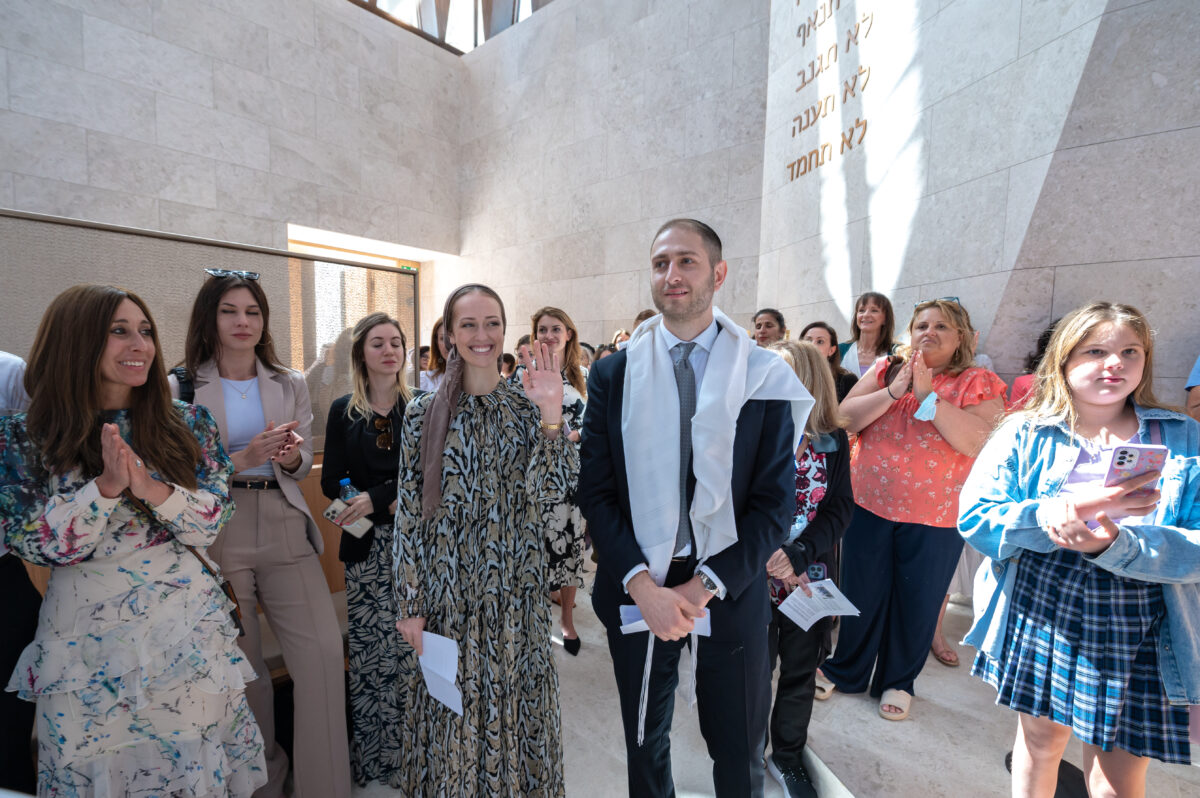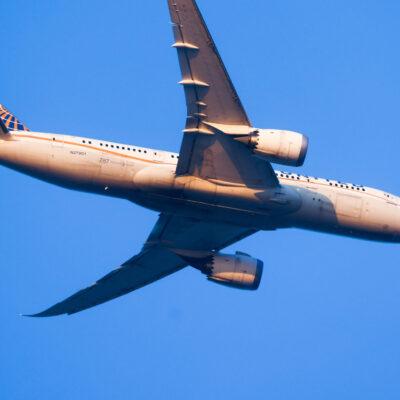
UAE Jewish community opens the Moses Ben Maimon Synagogue
The event at the Abrahamic Family House synagogue, attended by approximately 325 guests celebrating the landmark occasion with live music and food and the first prayer service to be held there
Abu Dhabi — Standing majestically alongside a mosque and church of equal external dimensions, with common white-stone exteriors and arching architectural styles, yet each with its own unique twist and respective religious symbols, the Moses Ben Maimon Synagogue in UAE capital was officially opened to the local Jewish community on Sunday. On Thursday evening the larger Abrahamic Family House, of which the Moses Ben Maimon Synagogue is a part, was inaugurated.
“It was very much a family celebration,” Rabbi David Rosen, the American Jewish Committee’s international director of interreligious affairs and former chief rabbi of Ireland, reflected after returning to Israel from Abu Dhabi on Sunday evening. “Joyous and quite chaotic.”
Rosen, who also attended the launch and opening forum of the Abrahamic Family House complex on Thursday and Friday, told Jewish Insider that Sunday was “the day of the Jewish community in the Emirates to celebrate the first Jewish synagogue to be built in the UAE.”
The event, attended by approximately 325 guests celebrating the landmark occasion with live music and food, included bringing a Torah scroll into the synagogue for the first time and affixing a mezuzah on a doorpost. Sunday also marked the first prayer service held in the synagogue as the afternoon prayer of Mincha was recited. Children’s activities for younger community members were on offer in the rabbinic residence of Rabbi Ben de Toledo and Rabbanit Yael de Toledo — the young couple who moved to Abu Dhabi from Jerusalem to help lead services at the synagogue. After the main gathering there was also an intimate upsherin — a ritual hair cutting tradition common in certain Jewish communities — for a local three-year-old boy from Saadiyat Island, marking another first of many celebrations at the site.

The words “amazing” and “historic” echoed throughout the synagogue, while long-time members of the UAE’s Jewish community reminisced about how far they had come, one of them telling JI how she used to bring two suitcases in from abroad to host Shabbat in the country.
At the front of the synagogue — hailed as the “first purpose-built synagogue” to open its doors in the Gulf in nearly 100 years — the Ten Commandments are written out in clear dark Hebrew letters on the cool stone walls, and two gold menorahs stand on either side of the wooden ark. Layers of geometric criss-cross lines rise up 30 meters to the roof, allowing light to filter in and giving a resemblance of a sukkah and wedding canopy.

Rabbi Yehuda Sarna, the chief rabbi of the Moses Ben Maimon Synagogue, opened the event and cantor Alex Peterfreund led the congregants through a series of verses. Sarna then invited Rabbi Levi Duchman, the first resident rabbi of the United Arab Emirates and head of Chabad in the UAE, to recite a Jewish prayer in Hebrew for the leaders and government of the UAE. The same prayer was also delivered in Arabic by Rabbi Yosef Hamdi, the leader of the small Jewish Yemenite community in Abu Dhabi that was rescued two years ago by the Emirati government. Hamdi’s 13-year-old son later sang a prayer himself, filling the synagogue with soulful Yemeni Arabic vocals. “Today is something special,” Hamdi told Jewish Insider. “For all the people of Israel.”
A hearty round of applause was given to the Abrahamic Family House’s Ghanaian-British architect, the award-winning Sir David Adjaye, who sat in the congregation with his family.
The crowd represented a microcosm of the multicultural society of the United Arab Emirates, a country of more than 200 nationalities living in the Gulf nation, according to government statistics.
“In one way or another, we are all on some kind of Abrahamic journey,” Sarna, who has been a driving force in the evolution of the Jewish community in the UAE, told the congregation.

“We have all responded to some kind of call bringing us here to the UAE. For each of us, our journey may have begun at a different point of origin. Participating in the ceremony today are Jews from Iran, from Yemen, from Europe, from Russia, from Ukraine, the U.K. and both Americas. Some of us have been here for decades and others have just arrived,” he continued.
“Our experience of the journey has been different. Some people have held Jewish practice with friends and family in their homes, others have helped convene in hotels,” Sarna said, reflecting a common thread heard among congregants about having previously held prayer services in their homes. “We have succeeded in creating meaningful points of convergence in temporary spaces.”
“But now, we have a synagogue, the first purpose-built synagogue in the region in almost a century. Our journeys are all intersecting here,” Sarna said. “This is the point where we can gather the sparks of light, where we can weave different threads together. In the Hebrew language, the smallest word, the smallest unit of meaning has two letters. One letter alone carries no meaning. Each person here is a letter in the story of our community. This space has brought us together to join person to person, letter to letter, and journey to journey.“
For longtime Jewish residents of the Gulf nation, Sunday’s festivities were for many years an unfathomable occurrence.
Ross Kriel, president of the Jewish Council of the Emirates, told JI the first synagogue in the UAE was in his home, when he moved to Dubai from South Africa 10 years ago. “So we’ve come from my living room to here in about 10 years, it’s amazing.”
“And now look at this extraordinary structure. It’s a monument obviously to tolerance but it’s a vision of our future. The Jewish people need to completely reimagine our place in the region,” Kriel asserted. “We need to be optimistic about our future and we need to think about our future, we need to plan it, we need to imagine it. Theodor Herzl, he knew what was coming — he saw the future,” Kriel said about the father of modern Zionism. “We need to see a future as well and be optimistic about it.’

“Everybody who lives in the UAE is wonderfully optimistic about the possibility for Jews, Muslims, Christians and people to come together with a shared vision, not just the children of Abraham but all of us, with a sense that our connection to God brings us closer to each other, that religion is a source of commonality and humanity rather than conflict and that we need to have a real profound optimism about humanity rather than being negative and cynical,” Kriel continued. “And that comes from here and that’s being led from here, and we want to transmit that to the Jewish people and into the world. So that’s what we’re going to do from here.”
Shaikha Almazrouei, a Muslim UAE native and stem-cell researcher, said the Abrahamic Family House provides the country’s different communities a place to exchange thoughts. “There are a lot of similarities between Jews and Muslims, and it’s really nice, [that we’re] making a lot of friends also. I’m really glad that we have opened the door for each other.”
Yaara Segal, who until recently served as chief of staff at the Israeli Embassy in Abu Dhabi, returned to the country to witness Sunday’s event. Segal said the emotion felt by the UAE Jewish community with each historic moment that they live through is still felt keenly. “We cannot take these things for granted and thankfully we haven’t been. It’s inspiring and we are so grateful and appreciative of this new reality that is growing and growing in the UAE, and we’re feeling it across the region,” she told JI.
Limor Seal, a British expat and member of the Abu Dhabi Jewish community, described the interfaith complex as “a testament to what the UAE is about. And the fact that they have a Ministry for Tolerance here — that just speaks for itself,” she said. Seal noted that she felt comfortable registering her young daughter as Jewish on her birth certificate in the UAE, but that she wouldn’t have done so back in the U.K.
“They should do this in Europe,” Pierre-Alain Avoyer, an Italian Swiss Roman Catholic who has been living in Abu Dhabi for 13 years, said of the Abrahamic Family House initiative. “It’s frightening what’s happening there. It’s so secular they want to make religion disappear. It’s aggressive secularism.”
Avoyer described the Abrahamic Family House as an “awareness-building tool,” and an important center of education for children — “more than a place to worship — that’s how I see it,” he said.
“I’ve been welcomed by the Jewish community — and I say this very sincerely — in a way which surprised me,” Avoyer said, having first been introduced to the religion by his Jewish wife.

Rev. Johnny Moore, president of the Congress of Christian Leaders, flew in for the Abrahamic Family House inauguration from Washington, D.C., after having spent several years traveling in the Middle East fostering relationships between Jews, Muslims and Christians. Referencing the shooting of two Jewish individuals in recent days outside a Los Angeles synagogue, Moore said, “and here we are in the United Arab Emirates, people walking around with kippahs and this synagogue is as packed as any synagogue I have been to in my entire life. People are praying for Israel and praying and blessing the UAE, it’s extraordinary and it’s history I couldn’t miss.“
Fittingly, the service ended with a rendition of the Jewish prayer for peace, Oseh Shalom, ringing out through the beams of the instantly iconic structure.


